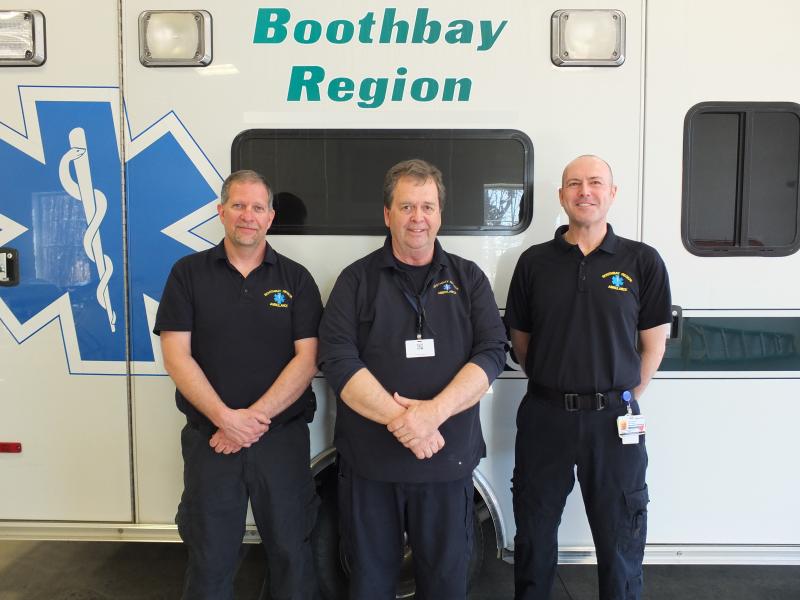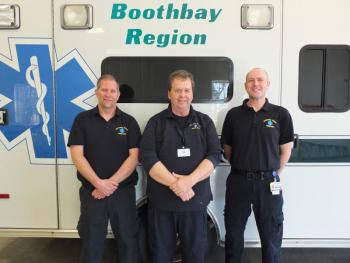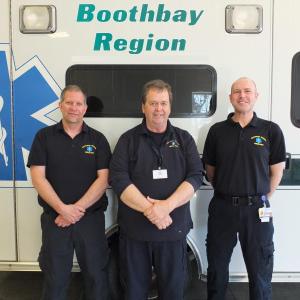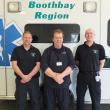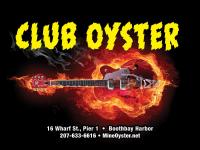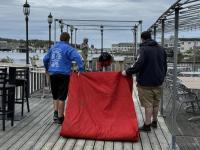BRAS grows despite continuing challenges from modern emergency health care
Decades ago, the local ambulance was a hearse. Here in Boothbay and nationwide, patients were often transported to the hospital in the roomy back of a Lincoln or Cadillac limousine-styled hearse. Beginning in 1934, Simmons & Harrington Funeral Home in Boothbay Harbor served as the local ambulance service. And people of a certain age remember Sonny Simmons driving the family business’s hearse and ambulance. In 1941, Simmons, at 15, was driving both vehicles.
By the mid-1970s, a new era of ambulance services emerged. With increased government regulations, volunteer ambulance services gave way to a more modern model of regional ambulance services and, in 1976, Simmons and a group of volunteers created Boothbay Region Ambulance Service.
This giant step forward resulted in several smaller steps in developing a highly trained professional service responding 24 hours a day, 365 days per year. In BRAS’s early days, first responders included an EMT or advanced EMT. Today, every transport includes a paramedic. The once all-volunteer service now has three three full-time employees and 33 part-timers. And the days of a fleet of one ambulance and a hearse back-up have been replaced by four state-of- the-art ambulances and one “fly car” vehicle.
But all of this progress requires money, and fees and insurance only cover roughly half of BRAS’s operating expenses. In Fiscal 20, BRAS has $1,247,736 in projected charges and $634,457 in projected revenue. Capped Medicare, Medicaid and Maine Care payments also contribute. Each year, BRAS seeks additional operating revenue from fundraising and municipal contributions. Next year’s proposed budget is $1,252,304. The service seeks contributions from Boothbay, Boothbay Harbor and Southport based on a formula consisting of population and number of emergency calls.
In March, Southport voters approved the requested $54,000. In May, Boothbay and Boothbay Harbor will hold town meetings and BRAS’s annual request is on both warrants. BRAS is requesting $295,000 from Boothbay Harbor and $268,640 from Boothbay. Director of Operations Scott Lash said the service plans on hiring another full-time employee and increasing pay and benefits to fill all 14 of the weekly 12-hour shifts.
“Our staffing model is a crew of two people with one being a paramedic. And all levels of health care are extremely short-staffed. It’s becoming increasingly more difficult to find people because of the low pay and increasing job demands,” Lash said.
Starting pay for a BRAS paramedic is $18.35 per hour. The service provides benefits only to full-time employees. So the labor pool for licensed paramedics and EMTs is a small one meaning local ambulance services compete with one another for workers.
“We have one guy who lives in Rumford. What you see is a lot of people in EMS (Emergency Medical Services) will work a shift in one place and move onto another job afterwards,” Lash said. The tight labor market has BRAS providing more competitive compensation rates. Next year, BRAS is offering enhanced pay and benefits. According to Lash, Wiscasset offers $2 more per hour for weekend services, Waldoboro offers a $100 bonus for holidays, and Topsham doubled the number of full-time staff.
Robbie Ham is a part-time BRAS EMT and chairman of the board of directors. He started in 1987 and understands the challenges facing the ambulance service. “There is a whole new level of responsibility for an EMT or paramedic. Travel time increased with the loss of the hospital so what was once a 10-15 minute drive has turned into a 25-40 minute run to either Miles or Midcoast. In the ambulance, you might take an x-ray or administer medications. It’s really been a huge evolution,” Ham said.
But after 32 years, Ham is still on the job. “It’s a weird thing, I started to help out because I thought it would be fun. I continue because it’s important for the community. It’s harder and harder to find people to do this because of the pay. And if we paid them what they were worth, the towns really couldn’t afford it.”
Despite the job’s challenges, it has perks which can’t be measured in dollars. BRAS has two longtime paramedics working a full-time schedule and enjoying providing an opportunity to make a difference in someone’s time of need.
Nathan Powell has 17 years’ experience as a paramedic and Stephen Harrison has 15. “I began as a 16 year old. I like working in the Midcoast and helping people who are injured or in a medical emergency.” Harrison previously worked as a building contractor for 37 years. He began as a part-time paramedic before moving to EMS full-time. “This is a second career for me. I’ve worked for all four services on the peninsula, and the best part is knowing you are helping people.”
Besides fees and contributions, BRAS pays the bills through fundraising. In January, the service began a $100,000 fundraising challenge for paying off an ambulance and supporting operational needs. Paul and Giselaine Coulombe pledged to match all contributions up to $50,000. In 2017, the Coulombes also made a $1.6 million gift to build a new ambulance center. Lash described the new facility as making a major impact on the service’s daily operation. “It’s twice the size of the previous center which allows housing all four ambulances and enough room for our on-duty staff to sleep when others are training,” Lash said.
The BRAS is a non-profit organization governed by an eight-person board of directors. Each town appoints a representative and there are five at-large members. In 2018, BRAS responded to 1,585 calls for the calendar year. Boothbay Harbor had the most with 830. Boothbay had 384 and Southport had 57.
Event Date
Address
United States

